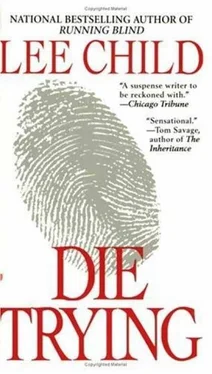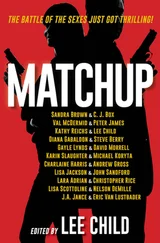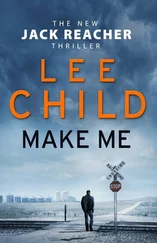Borken paused again. Reacher stared up at the swastika behind his head.
“Second method is the squeeze on small business,” Borken said. “This is a personal theory of mine. You don’t hear it much around the Movement. But I spotted it. It puts me way ahead of the others in my understanding.”
Borken waited, but Reacher still stayed silent. Looking away.
“It’s obvious, right?” Borken said to him. “World government is basically a communistic type of government. They don’t want a strong small-business sector. But that’s what America had. Millions of people, all working hard for themselves and making a living. Too many just to murder out of hand, when the time comes. So the numbers have to be reduced in advance. So the federal government was instructed to squeeze the small businessman. They put on all kinds of regulations, all kinds of laws and taxes, they rig the markets, they bring the small guy to his knees, then they order the banks to come sniffing around with attractive loans, and as soon as the ink is dry on the loan papers they jack up the interest, and rig the market some more, until the poor guy defaults. Then they take away his business, and so that’s one less for the gas ovens when the time comes.”
Reacher glanced at him. Said nothing.
“Believe it,” Borken said. “It’s like they’re solving a corpse-disposal problem in advance. Get rid of the middle class now, they don’t need so many concentration camps later.”
Reacher was just staring at Borken’s eyes. Like looking at a bright light. The fat red lips were smiling an indulgent smile.
“I told you, we’re way ahead of the others,” he said. “We’ve seen it coming. What else is the Federal Reserve for? That’s the key to this whole thing. America was basically a nation founded on business, right? Control business, you control everything. How do you control business? You control the banks. How do you control the banks? You set up a bullshit Federal Reserve system. You tell the banks what to do. That’s the key. The world government controls everything, through the Fed. I’ve seen it happen.”
His eyes were open wide. Shining with no color.
“I saw them do it to my own father,” he screamed. “May his poor soul rest in peace. The Fed bankrupted him.”
Reacher tore his gaze away. Shrugged at the corner of the room. Said nothing. He started trying to recall the sequence of titles in Borken’s fine mahogany bookcase. Warfare from ancient China through Renaissance Italy through Pearl Harbor. He concentrated on naming the titles to himself, left to right, trying to resist the glare of Borken’s attention.
“We’re serious here,” Borken was saying again. “You may look at me and think I’m some kind of a despot, or a cult leader, or whatever the world would want to label me. But I’m not. I’m a good leader, I won’t deny that. Even an inspired leader. Call me intelligent and perceptive, I won’t argue with you. But I don’t need to be. My people don’t need any encouraging. They don’t need much leading. They need guidance, and they need discipline, but don’t let that fool you. I’m not coercing anybody. Don’t make the mistake of underestimating their will. Don’t ignore their desire for a change for the better.”
Reacher was silent. He was still concentrating on the books, skimming in his mind through the events of December 1941, as seen from the Japanese point of view.
“We’re not criminals here, you know,” Borken was saying. “When a government turns bad, it’s the very best people who stand up against it. Or do you think we should all just act like sheep?”
Reacher risked another glance at him. Risked speaking.
“You’re pretty selective,” he said. “About who’s here and who’s not.”
Borken shrugged.
“Like unto like,” he said. “That’s nature’s way, isn’t it? Black people have got the whole of Africa. White people have got this place.”
“What about Jewish dentists?” Reacher asked. “What place have they got?”
Borken shrugged again.
“That was an operational error,” he said. “Loder should have waited until he was clear. But mistakes happen.”
“Should have waited until I was clear, too,” Reacher said.
Borken nodded.
“I agree with you,” he said. “It would have been better for you that way. But they didn’t, and so here you are among us.”
“Just because I’m white?” Reacher said.
“Don’t knock it,” Borken replied. “White people got precious few rights left.”
Reacher stared at him. Stared around the bright, hate-filled room. Shuddered.
“I’ve made a study of tyranny,” Borken said. “And how to combat it. The first rule is you make a firm decision, to live free or die, and you mean it. Live free or die. The second rule is you don’t act like a sheep. You stand up and you resist them. You study their system and you learn to hate it. And then you act. But how do you act? The brave man fights back. He retaliates, right?”
Reacher shrugged. Said nothing.
“The brave man retaliates,” Borken repeated. “But the man who is both brave and clever acts differently. He retaliates first. In advance. He strikes the first blows. He gives them what they don’t expect, when and where they don’t expect it. That’s what we’re doing here. We’re retaliating first. It’s their war, but we’re going to strike the first blows. We’re going to give them what they don’t expect. We’re going to upset their plans.”
Reacher glanced back at the bookcase. Five thousand classic pages, all saying the same thing: don’t do what they expect you to do.
“Go look at the map,” Borken said.
Reacher thrust his cuffed hands forward and lifted himself awkwardly out of the chair. Walked over to the map of Montana on the wall. He found Yorke in the top left-hand corner. Well inside the small black outline. He checked the scale and looked at the contour shading and the colors. The river Joseph Ray had talked about lay thirty miles to the west, on the other side of high mountains. It was a thick blue slash running down the map. There were enormous brown heights shown to the north, all the way up to Canada. The only road ran north through Yorke and terminated at some abandoned mine workings. A few haphazard tracks ran through solid forest to the east. To the south, contour lines merged together to show a tremendous east-west ravine.
“Look at that terrain, Reacher,” Borken said quietly. “What does it tell you?”
Reacher looked at it. It told him he couldn’t get out. Not on foot, not with Holly. There were weeks of rough walking east and north. Natural barriers west and south. The terrain made a better prison than wire fences or mine-fields could have. He had once been in Siberia, after glasnost, following up on ancient stories about Korean MIAs. The gulags had been completely open. No wire, no barriers. He had asked his hosts: but where are the fences? The Russians had pointed out over the miles of snow and said: there are the fences. Nowhere to run. He looked up at the map again. The terrain was the barrier. To get out was going to require a vehicle. And a lot of luck.
“They can’t get in,” Borken said. “We’re impregnable. We can’t be stopped. And we mustn’t be stopped. That would be a disaster of truly historic proportions. Suppose the redcoats had stopped the American Revolution in 1776?”
Reacher glanced around the tiny wooden room and shuddered.
“This isn’t the American Revolution,” he said.
“Isn’t it?” Borken asked. “How is it different? They wanted freedom from a tyrannical government. So do we.”
“You’re murderers,” Reacher said.
“So they were in 1776,” Borken said. “They killed people. The established system called that murder, too.”
Читать дальше












